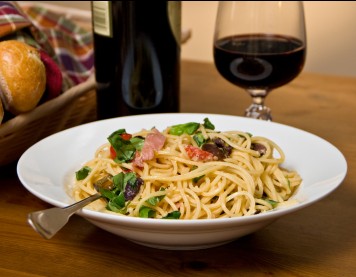Names Change Behavior
 A new study by David Just and Brian Wansink of the Cornell Food & Brand Lab found that calling the same portion of spaghetti “double-size” instead of regular caused diners to eat less. In fact, the double-size group left 10 times as much food on their plates!
A new study by David Just and Brian Wansink of the Cornell Food & Brand Lab found that calling the same portion of spaghetti “double-size” instead of regular caused diners to eat less. In fact, the double-size group left 10 times as much food on their plates!
We know that our expectations change our experience with a product as well as our behavior. Wine thought to be expensive taste better than the same wine when tasters think it is inexpensive (see Why Expensive Wine Tastes Better); another study showed that people ate more food when it was accompanied by “California” wine vs. “North Dakota Wine” that was, of course identical (see Wine and the Spillover Effect).
So, it’s no surprise that the way food portions are described changes how much people eat.
Marketers of all products need to keep this in mind as they name their products, describe different models or options, and so on. People are non-consciously influenced by what products are called.
Dieters Beware
There’s a lesson here for dieters, too. You will tend to eat more if the portion you order is described in terms like “small” or “regular.” There are no standard rules or definitions for portion sizes, and if a restaurant described the same amount as “super-sized” or “jumbo” you might either avoid it or eat less. Restaurants, particularly high volume fast food operations, generally strive to maximize their revenue per customer. This may lead them to encourage ordering larger sizes in drinks, french fries, etc. One way to do this is to make the larger sizes seem normal or typical. Calorie counters should avoid paying attention to how the items are named and instead focus on concrete measures like ounces of product, grams of fat, etc.
Plausibility is Critical
If marketers want to invoke the naming effect for a product, it’s important that the name be plausible. The expensive wine label worked because the wine was at least fairly drinkable; had it tasted like vinegar, telling people it cost $50 wouldn’t have offset the awful flavor. Similarly, the “double-sized” dish in the Cornell experiment was two cups in size. That’s not as enormous as some pasta plates I’ve seen, but it’s certainly believable as a double portion. (Serving it on a small plate would help, too – see Chef’s Secret: How to Make Your Product Look Bigger
So, in naming your product, it’s a good idea to reach a little in the direction of the characteristics you want customers to see in your product. But don’t overreach – a tiny serving of spaghetti labeled as “double-sized” would result in customers who were angry or amused, but definitely not satisfied.

[…] This study shows the licensing effect in full, er, effect. Label a meal “small” or “regular” and people eat more of it. But there’s also a kind of reverse licensing effect – if you label something “double-size” people eat an awful lot less. […]
[…] A new study by David Just and Brian Wansink of the Cornell Food & Brand Lab found that calling the same portion of spaghetti “double-size” instead of regular caused diners to eat less. In fact, the double-size group left 10 times as much food on their plates! – See more at: [article] […]
Fascinating. Great share.
Interesting post Roger. It’s amazing how it is so easy to fool customers with such subtle strategies.
Definitely an interesting post, Thanks for sharing!
Roger, Your article made me smile. I am always questioning where names for products come from. Like names of cars, many are named for things in nature. As though I could be part of nature by driving that model. It’s all association in the mind of the listener and how receptive they are to the suggestion.
Anyway thanks for a well thought out article!
Never heard such a thing before..
[…] y como Roger Doodley expone en su blog, sabemos que nuestras expectativas cambian nuestra experiencia con un producto […]